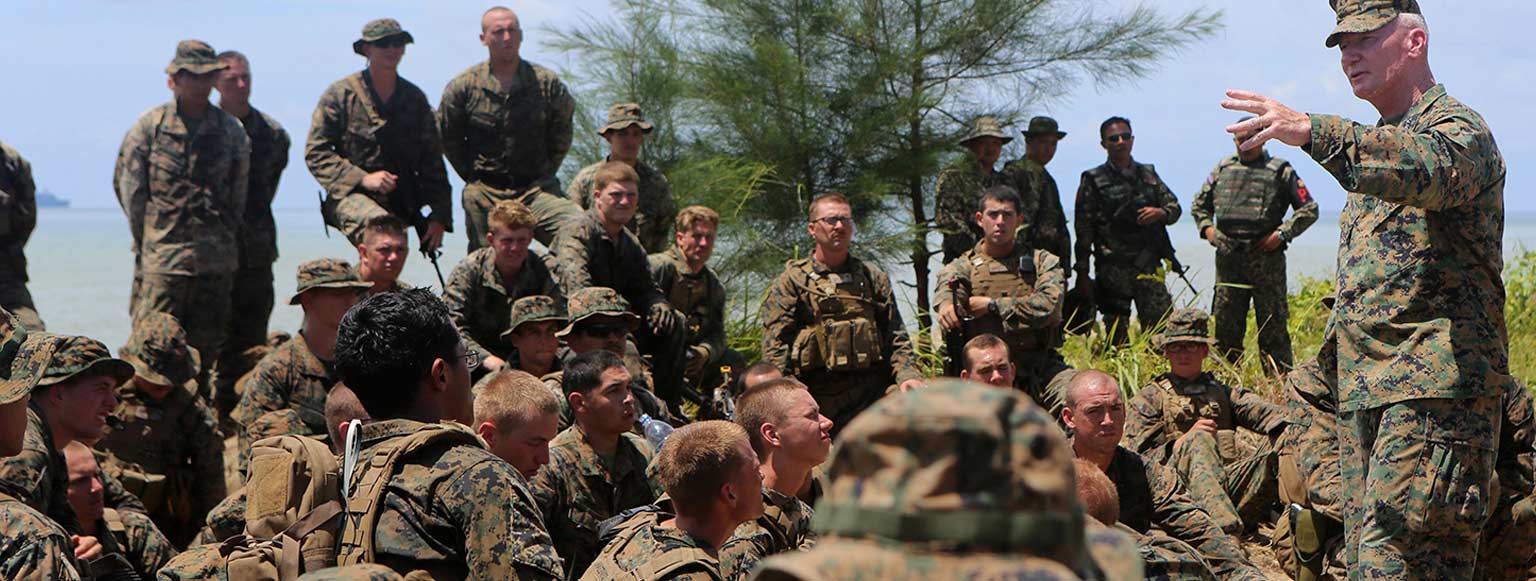Principles and Traits of Marine Corps Leadership, Part 7

When pianists learn a challenging piece of music, they often will learn the music for each hand separately and then, when the left and right hands have control of their parts, put the two together training to perform the piece as it is meant to be done. The structure of this process is found in the Marine Corps when we consider, for example, that each Marine should know himself and seek self-improvement, should achieve and maintain technical and tactical proficiency, but also, and this is the leadership principle we are examining this month, “Train your Marines and Sailors as a Team.” Each Marine must work independently to be as proficient as possible, but must also train with others as a team to perform a mission as it is meant to be done. Here the particular strengths and weaknesses of individuals must be recognized and coordinated into an efficient and effective unit, and thus here we see the importance of the leadership principle of knowing your people and seeking their welfare. As we have seen in our January issue, this principle of knowing your people is described in part this way: “ ‘Know your people’—or team—is among the most important leadership principles. The core value focuses on fostering relationships between team members and developing an identity.”
People who teach in classrooms or seminars understand from experience that each group of students or participants has its own dynamic “personality,” and it is part of the job of an instructor to read that personality and guide the group in harmony with it. Of course, how this is done is itself guided and constrained by the purpose for which the group exists. Moreover, a group of people who gather to learn a topic or to study a professional practice has a very different purpose from one that exists to train for and to conduct combat missions since, clearly, both the actions and their consequences are of a different magnitude. This difference may seem foreign to people who have never been in combat, and perhaps even more foreign to people who did not serve in the military. Yet it is integral to the mission of the Al Gray Marine Leadership Forum at Carolina Museum of the Marine to make the important lessons of Marine Corps leadership available to all Americans for personal growth and for effective operation of organizations regardless of mission.
The idea of training Marines and Sailors as a team is a broad one, so we should give a rather full account of the description as we find it.
There are many opportunities for individual growth and advancement in the Marine Corps. However, not everything in the military should be about personal achievement, even if it’s crucial in many other ways. Marines, especially as leaders, must be able to function as a single unit. Therefore, the better they are at communicating and establishing relationships with team members, the better they will be at their job. For this reason, Marines spend much of their training finding methods to improve teamwork and organization within a unit. The crisper and tighter the unit, the more likely the group is to have success as a team. Teams in the military not only rely on each other for the success of a mission but also for their own personal welfare. Accordingly, Marines should always train as a team, including during circumstances where fellow sailors join from the U.S. Navy. Often, teamwork involves finding the strengths and weaknesses of each service member and combining those talents to function as one team. For this reason, it’s imperative that each member of a team understand their role and purpose within the unit.
There are several things at work here. As important as individual growth is, Marines must be able to function as a single unit, and in order to achieve this, each Marine must understand his role and purpose within it, and the roles and purposes of other members of the unit. Thus it is important to the effective functioning of a unit that each member can do his job well, understanding how this is done in concert with others. It is most valuable for the consistently effective function of a unit that its members understand and trust one another. Important to achieving and maintaining this is communication. Members should and will talk among themselves, but there must be effective communication also between leaders and troops. When examining the Marine leadership principle of keeping your Marine personnel informed, we read that “…it’s impossible to build confidence and trust without first developing strong communication.” Thus we see the importance of communication in the Marine leadership principle of ensuring the task is understood, supervised, and accomplished. All three of the steps in this principle, making the task understood, supervising it, and seeing the task through to completion, require clear and effective communication. Importantly, as members of a unit grow in their ability to communicate and to act effectively together, they grow in confidence and trust among themselves, making the unit ever more effective.
The Marine leadership trait of initiative is understood as the ability to complete a task even when not directed to by a supervisor and to finish a project regardless of available resources. Three examples of initiative are:
“Asking for additional responsibilities, including those outside your job description.”
“Requesting consistent feedback from supervisors and other team members.”
“Predicting potential challenges and discussing them with your squad.”
These examples involve important and varied types of communication and importantly involve the person exercising initiative with improving his value to the unit and to its mission. One may receive additional responsibilities that require further study and learning, thus increasing one’s competence and value to the unit. Regular feedback from supervisors and team members bring focus to the mind when considering how to improve, and this sharpens one’s ability to think analytically and to spot potential challenges for which team members can prepare before the unexpected arises. Interestingly, initiative expressed in these ways establishes and improves the ability of someone to lead both self and others.
Initiative is a trait of individuals and while some traits may be natural to someone, others must be developed. In order to develop traits one doesn’t naturally possess, one must want to develop them. This may seem obvious, since it is, but the first Marine leadership principle, to know oneself and seek to improve, enjoins individual Marines to want to improve because for some people, perhaps many, the trait of initiative by which people seek self-improvement, is not naturally possessed. Yet the traits of Marine leaders are traits that human beings in general may develop, and to the extent these traits are developed and possessed, they make someone better in all domains of life, and make individual lives more interesting, personally productive, and happy.
It might be useful to say something about what is meant by being happy. In the history of western thought, much attention has been given to the idea of happiness because there has been general agreement that whatever particular things individual people may want, everyone desires to be happy. Plato (d. 348 B.C.) found happiness to lie in the vision of the good. His argument is complex but rests on the view that the mind is the most noble part of human beings, and so contemplation of the good (which for Plato is the entity of ultimate value) is the highest fulfillment of a person, and therefore the meaning of happiness. Aristotle (d. 322 B.C.) found happiness to be the product of living a life of virtue according to reason. He uses the word eudaimonia to describe the inner disposition of someone living virtuously according to reason, and while the word is usually translated as “happiness,” it really identifies a “well-ordered soul” in which the mind, will, and emotions are in proper and healthy relation one to another. St. Augustine of Hippo Regius in North Africa (d. 430 A.D.), described happiness as the abiding inner peace that is the consequence of being in communion with God. Thomas Aquinas (d. 1274 A.D.) thought that happiness actually belongs to the life to come, and so is not obtainable in this life. While this seems dreary, he did think that in this life one could obtain felicity, which is a condition suited to we humans as we presently are. There is some explanatory value in this distinction, but Thomas’ understanding of felicity places it well within the tradition of analysis concerning happiness.
The important virtue of prudence may be understood as the ability to see how general principles apply to the complexities of particular circumstances. The Marine leadership trait of judgment is remarkably similar to prudence, described in part as “the ability to make sensible decisions consistently after calmly examining important details.” (Of course, this description assumes an ability to distinguish more from less important details). The fourteen traits of Marine leadership constitute a fine example of a well-developed human being, able competently to apply to particular circumstances the eleven principles of leadership. It is important to see that the principles and traits of leadership are within the reach of nearly everyone, given sufficient desire and effort, and the process of acquiring them is the process of growing as a human being. This is a reminder of the bracing advice given by 19th century classicist Basil Gildersleeve to his students at UVA: “Grow, don’t climb.”

